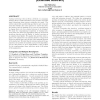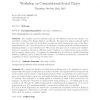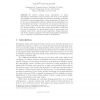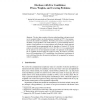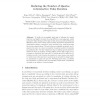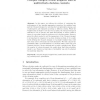ALDT
2015
Springer
9 years 10 months ago
2015
Springer
103
click to vote
ALDT
2015
Springer
9 years 10 months ago
2015
Springer
: The minisum and the minimax rules are two different rules for the election of a committee considered by Brams, Kilgour, and Sanver. As input they assume approval ballots from th...
100
click to vote
ALDT
2015
Springer
9 years 10 months ago
2015
Springer
Abstract. We address optimal group manipulation in multidimensional, multi-facility location problems. We focus on two families of mechanisms, generalized median and quantile mecha...
212
click to vote
ALDT
2015
Springer
9 years 10 months ago
2015
Springer
It is well known that standard game-theoretic approaches to voting mechanisms lead to a multitude of Nash Equilibria (NE), many of which are counter-intuitive. We focus on truth-bi...
116
click to vote
ALDT
2015
Springer
9 years 10 months ago
2015
Springer
We show that a number of election-related problems with prices (such as, for example, bribery) are fixed-parameter tractable (in FPT) when parameterized by the number of candidate...
137
click to vote
ALDT
2015
Springer
9 years 10 months ago
2015
Springer
To tackle the potentially hard task of defining the reward function in a Markov Decision Process (MDPs), a new approach, called Interactive Value Iteration (IVI) has recently been...
ALDT
2015
Springer
9 years 10 months ago
2015
Springer
Abstract. We propose a framework for automated multi-attribute decision making, employing the probabilistic non-monotonic description logics proposed by Lukasiewicz in 2008. Using ...
120
click to vote
ALDT
2015
Springer
9 years 10 months ago
2015
Springer
Many mathematical frameworks aim at modeling human preferences, employing a number of methods including utility functions, qualitative preference statements, constraint optimizatio...
114
click to vote
ALDT
2015
Springer
9 years 10 months ago
2015
Springer
In this paper, we address the problem of comparing the performances of two popular aggregation operators, the weighted sum and the Choquet integral, for selecting the best alternat...
110
click to vote
ALDT
2015
Springer
9 years 10 months ago
2015
Springer
Moving beyond the dualistic view in AI where agent and environment are separated incurs new challenges for decision making, as calculation of expected utility is no longer straigh...
